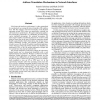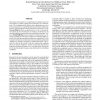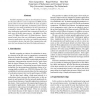156
click to vote
HPCA
1998
IEEE
15 years 6 months ago
1998
IEEE
Good network hardware performance is often squandered by overheads for accessing the network interface (NI) within a host. NIs that support user-level messaging avoid frequent ope...
HPCA
1998
IEEE
15 years 6 months ago
1998
IEEE
We propose and evaluate two complementary techniques to protect and virtualize a tightly-coupled network interface in a multicomputer. The techniques allow efficient, direct appli...
144
Voted
HPCA
1998
IEEE
15 years 6 months ago
1998
IEEE
Parallel computing on clusters of workstations is attractive because of the low costs in comparison to MPPs, but the speed of the local area network limits the class of applicatio...
109
click to vote
HPCA
1998
IEEE
15 years 6 months ago
1998
IEEE
The explosive growth in the performance of microprocessors and networks has created a new opportunity to reduce the latency of fine-grain communication. Microprocessor clock speed...
114
click to vote
HPCA
1998
IEEE
15 years 6 months ago
1998
IEEE
A key challenge in achieving high performance on software DSM systems is overcoming their relatively large communication latencies. In this paper, we consider two techniques which...
HPCA
1998
IEEE
15 years 6 months ago
1998
IEEE
132
click to vote
HPCA
1998
IEEE
15 years 6 months ago
1998
IEEE
The goal of this paper is to gain insight into the relative performance of communication mechanisms as bisection bandwidth and network latency vary. We compare shared memory with ...
131
click to vote
HPCA
1998
IEEE
15 years 6 months ago
1998
IEEE
Most of the prediction mechanisms predict a single path to continue the execution on a branch. Alternatively, we may exploit parallelism from either possible paths of a branch, di...
HPCA
1998
IEEE
15 years 6 months ago
1998
IEEE
HPCA
1998
IEEE
15 years 6 months ago
1998
IEEE



